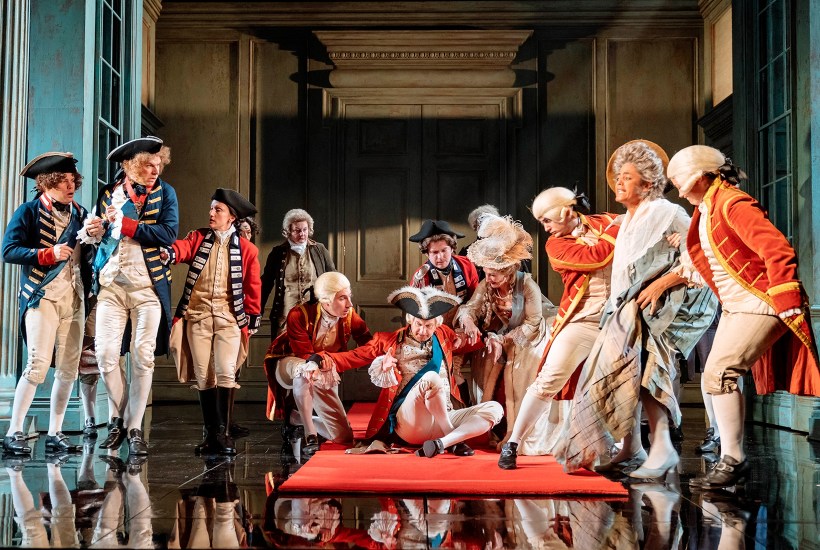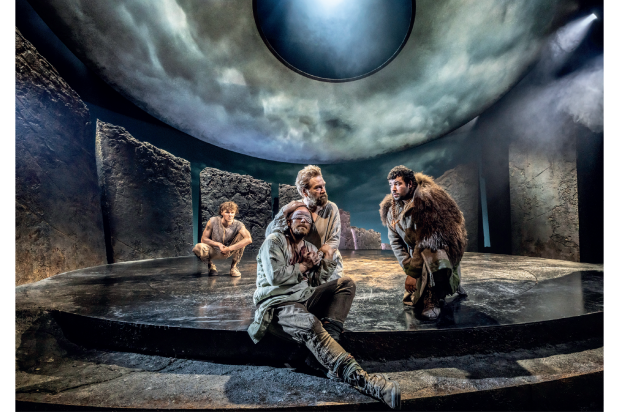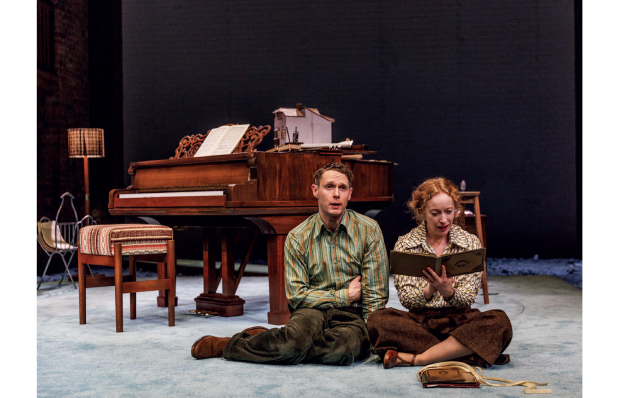The longest interval in theatre history continues. Last week the National Theatre livestreamed a 2018 version of The Madness of George III produced by Nottingham Playhouse with Mark Gatiss in the title role. The script, written by Alan Bennett as a response to King Lear, is much easier to like than the original.
An engaging family comedy, with a sad bit in the middle, it benefits from a wonderfully happy ending. The good king is cured, the bad doctors are vanquished, order is restored. A real crowd-pleaser. Bennett’s research gives it the feeling of a documentary drama as he examines the difficulties faced by monarchs who wielded real political power. Family feuds spilled over into public affairs, and if the king happened to run an empire the consequences could be global.
The portrait of George is multifaceted, contradictory, instantly human. He adores his chubby German wife,‘You are a good little woman, Mrs King,’ but he can’t abide his profligate son, the future George IV. ‘Want to hump the old bird out of its nest, is that it, you great cuckoo?’ In keeping with the time, George keeps a mistress or two but even here he behaves with endearing gallantry. Suggesting a tryst with Lady Pembroke, he says: ‘Did we ever forget ourselves utterly? Because if we did forget ourselves I would so like to remember.’
As his madness approaches, he falls into the hands of quacks, who seem a lot nuttier than their patient. ‘I have always found the stool more eloquent than the pulse,’ says a doctor with a dung fixation. Another, who today would face criminal charges, enjoys scalding the king’s shaven head with preheated suction cups. ‘These blisters have healed up nicely. Which won’t do at all. They must be kept open.’ The tussle for power between the medics is won by Dr Willis (a brilliantly slippery Adrian Scarborough), whose approach is no less brutal than his rivals’. ‘He must be broken as a horse is broken.’ But he’s not a monochrome baddie and he understands the limits of his knowledge. ‘I can cure him. I’m just not sure what from.’
Mark Gatiss’s performance, like the play, falls into two halves. He begins all warmth, sprightliness and energy. There’s an irresistible charm to his habits of speech and movement. As he teeters on the brink of lunacy he studies himself with contrapuntal wit. ‘I’m not going out of my mind; my mind is going out of me.’ And then the fits of raving and gabbling begin. Here things change. Gatiss delivers a perfunctory drama-school exercise. The arms flail. The neck twists. The jaw widens. The voice howls. It may be a pitiful spectacle but his torment is too well measured to be moving. When his sanity returns he instantly regains his winning swagger and comic poise. Some reviewers have called for Gatiss to play Lear on the strength of this George III. But his brand of feathery urbane comedy would be better suited to Coward or Wilde.
If you want to yank Romeo and Juliet out of the Elizabethan era where do you put it? One answer is ‘nowhere in particular’. Erica Whyman’s RSC production looks modern, or modernish, but it uses no specific historic stylings. The stage is bare apart from a hollow cube, about five-feet high, which represents Juliet’s bedroom, her balcony, the market square, the apothecary’s cell and, finally, the burial crypt. It’s amazing how much you can do with virtually nothing. Whyman brings the same minimalist aesthetic to the fencing bouts. Too often in Shakespeare we see duellists prancing around the stage, clattering their swords together harmlessly or swinging them over each other’s heads for fear of leaving a gash in a colleague’s arm or cheek. Here, the swords have gone. When Tybalt and Mercutio come to blows they grapple, hand to hand, like brawling drunkards. Only at the moment of death is a small blade drawn and buried in the victim’s side. A great innovation.
Bally Gill is powerful and charismatic in the lead role but he looks a little too normal (think Blue Peter presenter) to capture the rhapsodic impetuosity and physical daring of Romeo. Karen Fishwick gives Juliet plenty of wild-child petulance. Mercutio (Charlotte Josephine) has been encouraged to gesticulate and shout too much. The Queen Mab speech offers us a glimpse of Mercutio’s dreamy and imaginative side. It shouldn’t be belted out at harbour-master volume.
Raphael Sowole brings an amazing quality of stillness to the small role of Tybalt. He has the air of a leading man. As does Andrew French, who gives Friar Laurence an unusual spiritual quality. At times he seems to be auditioning for Hamlet. One jarring and unShakespearean note has been added. Friar Laurence is seen to yearn sexually for Romeo. Come off it.
Got something to add? Join the discussion and comment below.
Get 10 issues for just $10
Subscribe to The Spectator Australia today for the next 10 magazine issues, plus full online access, for just $10.
You might disagree with half of it, but you’ll enjoy reading all of it. Try your first month for free, then just $2 a week for the remainder of your first year.














Comments
Don't miss out
Join the conversation with other Spectator Australia readers. Subscribe to leave a comment.
SUBSCRIBEAlready a subscriber? Log in